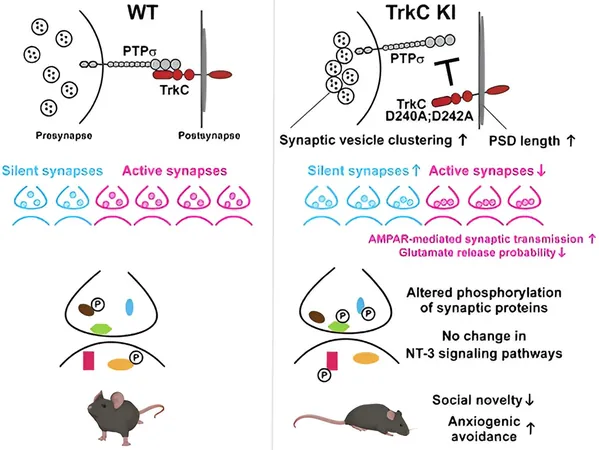
New Breakthrough in Brain Connectivity Research Could Revolutionize Anxiety Disorder Treatments!
2024-10-11
Author: Nur
Unlocking the Secrets of Synapses
Defects in synapse organization are notorious for being associated with various neuropsychiatric conditions. However, the mechanisms that orchestrate these connections within our brains remain largely elusive. The findings from this study promise not only to elucidate these mechanisms but also to pave the way for new therapeutic approaches for conditions such as anxiety disorders.
Anxiety Disorders: A Growing Global Concern
Mental health disorders, particularly anxiety disorders, autism, and schizophrenia, pose significant challenges both in Canada and around the globe. The complexity of the brain has made drug development for these conditions exceedingly difficult. Currently, scientists are racing against time to decode the mechanisms that lead to cognitive disorders.
Synapses—the junction points between neurons—are pivotal for transmitting signals throughout the brain. Any impairment in excitatory synapses, which facilitate neuronal communication, can heighten the risk of mental health conditions.
A Closer Look at TrkC-PTPσ: The Key Protein Complex
Diving deeper, the study highlights the discovery of a novel protein complex called TrkC-PTPσ, which is found exclusively in excitatory synapses. Notably, the genes responsible for this complex, NTRK3 and PTPRS, are linked to conditions like anxiety disorders and autism. Until now, the intricacies of how this complex influences synapse development and cognitive functions were largely unknown.
Research spearheaded by doctoral student Husam Khaled has revealed that the TrkC-PTPσ complex is essential for the structural and functional maturation of excitatory synapses. It meticulously regulates the phosphorylation—an important biochemical modification—of various synaptic proteins. Disruption of this complex, as observed in experiments with genetically modified mice, led to distinct behavioral issues.
The Link Between Structure and Behavior
In an exploration of brain structure, researchers created mice with intentional genetic mutations affecting the TrkC-PTPσ complex. This approach unveiled the complex's critical functions, showing how it modulates proteins associated with synapse structure and organization. High-resolution imaging illuminated the consequences of these mutations: an abnormal arrangement of synapses and an alarming rise in inactive synapses marked by faulty signal transmission.
Behavioral evaluations of the mutant mice illuminated elevated anxiety levels, particularly a marked tendency to avoid unfamiliar environments and diminished social interactions. These findings underscore the potential of targeting the TrkC-PTPσ protein complex to develop innovative treatments for anxiety disorders.
The Path Forward: Implications for Therapy
With the research establishing a promising animal model exhibiting anxiety-like behaviors, scientists are optimistic about harnessing these insights to devise novel therapeutic strategies. As the world grapples with the burden of mental health disorders, this groundbreaking study offers a beacon of hope, signaling advancements in understanding and ultimately treating such conditions.
This exploration of the molecular underpinnings of brain connectivity is critical not just for academic purposes but represents a potential paradigm shift in how we approach and treat anxiety disorders, unlocking a future where effective interventions might be a reality. As we continue to unravel the mysteries of the human brain, the implications of this research may resonate far beyond the lab, directly impacting the lives of millions suffering from anxiety and related disorders. Keep your eyes peeled for developments in these thrilling findings that could change everything!


 Brasil (PT)
Brasil (PT)
 Canada (EN)
Canada (EN)
 Chile (ES)
Chile (ES)
 España (ES)
España (ES)
 France (FR)
France (FR)
 Hong Kong (EN)
Hong Kong (EN)
 Italia (IT)
Italia (IT)
 日本 (JA)
日本 (JA)
 Magyarország (HU)
Magyarország (HU)
 Norge (NO)
Norge (NO)
 Polska (PL)
Polska (PL)
 Schweiz (DE)
Schweiz (DE)
 Singapore (EN)
Singapore (EN)
 Sverige (SV)
Sverige (SV)
 Suomi (FI)
Suomi (FI)
 Türkiye (TR)
Türkiye (TR)